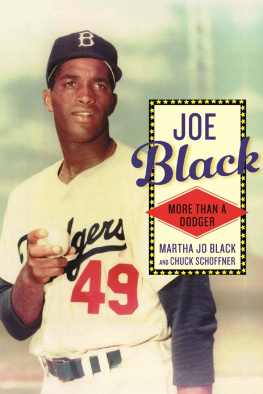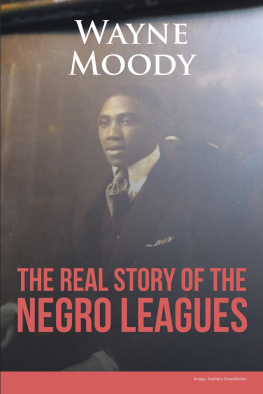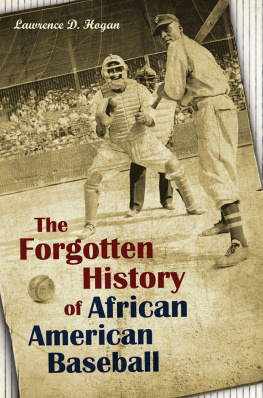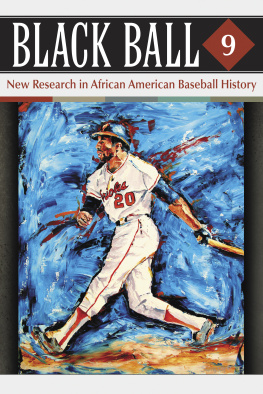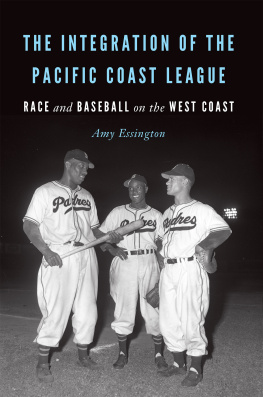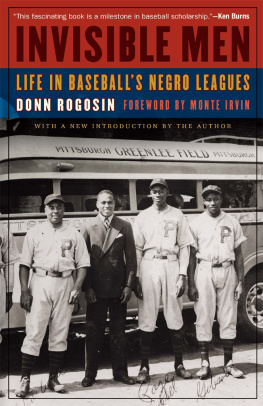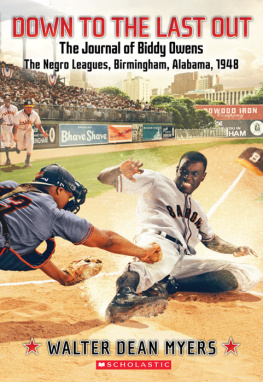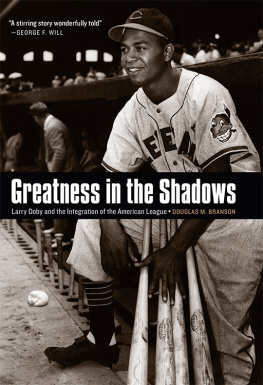$27.95 (CAN $33.95)
W hen Joe Black was in high school, a Major League scout told him that the color of his skin would keep him out of the big leagues, but he took to heart his mothers words of wisdom: Aint nobody better than you.
In an era when only six Major League Baseball teams had African American players, pitcher Joe Black worked his way up through the Negro leagues, and the Cuban League, finally bursting into the majors in 1952 when he signed with the Brooklyn Dodgers. In the face of segregation, verbal harassment, and even death threats, Joe Black rose to the top of his game; in his first stellar season, he was named National League Rookie of the Year and became the first African American pitcher to win a World Series game.
With the same tenacity he showed in his baseball career, Black became the first African American vice president of a transportation corporation when he went to work for Greyhound. In this first-ever biography of Joe Black, his daughter Martha Jo Black tells the story not only of a baseball great who broke through the color line but also of the father she knew and loved.
Copyright 2015 by Martha Jo Black and Chuck Schoffner
Foreword copyright 2015 by Peter OMalley
All rights reserved
Published by Academy Chicago Publishers
An imprint of Chicago Review Press Incorporated
814 North Franklin Street
Chicago, Illinois 60610
ISBN 978-0-89733-753-3
Library of Congress Cataloging-in-Publication Data
Is available from the Library of Congress.
Interior design: Sarah Olson
All photos courtesy of Martha Jo Black
Printed in the United States of America
5 4 3 2 1
Contents

Index
FOREWORD

W HEN I L EARNED THAT THE TITLE OF this book was Joe Black: More Than a Dodger, I had to nod in agreement. It definitely sums up the amazing career of a man who was very special to me. Thinking back to my youth, I still visualize going to Ebbets Field with my parents and watching the Dodgers play. In 1952, when I was fourteen years old, right-handed pitcher Joe Black burst onto the Major League scene with such a splash that fans instantly were attracted to him and his imposing six-foot-two frame. Plus, his lively fastball was fun to watch.
Joe won fifteen games and saved fifteen more as a rookie that season, capturing the hearts of Dodger fans everywhere. Few knew of his prior successes with the Negro leagues Baltimore Elite Giants and with the Cuban Winter League. Joe helped lead the Dodgers to the National League pennant and became the first African American pitcher to win a World Series game in the 1952 postseason. He was named National League Rookie of the Year that season.
This books remarkable journey guides the reader on and off the playing fields of another eraone that was extremely challenging for a young African American. This was at a time when only six of sixteen Major League Baseball teams had an African American player on their roster. Like Jackie Robinson and other great African American players of his time, Joe endured the ignominy of catcalls, separate living and dining areas on the road, and death threats. He repeatedly withstood insults from those who shunned him because of the color of his skin. As a high school player in Plainfield, New Jersey, coaches told Joe that he couldnt play in the big leagues, strictly because he was black. When he was in college at Morgan State in Baltimore, Joe tried to attend local church services, but was unexpectedly turned away. His mother soothed his wounds with her important credo, Aint nobody better than you! This gave him an inner strength and purpose to bite his lip and learn to keep his fists down, even when the anger was so strong.
Joe was many things: learned, benevolent; an outstanding athlete; a good father to his daughter, Martha Jo, and his son, Chico; and a successful businessman. Joes education and baseball career equipped him for life after the game. He earned an advanced degree and then worked as a teacher at the elementary, junior high, and high school levels before moving into a high-profile job in the private sector. His years with Greyhound, where he became the first African American vice president of a transportation company, provided him with a post-baseball profession, in which he expertly used his marketing skills and wide-ranging associations. He was fondly known as Mr. Greyhound.
Ill always remember Joes keen sense of humor and his big smile. Joe maintained friendships with many of his teammates and opposing players. He was extremely well liked. He truly enjoyed giving back, unselfishly opening doors to help pave the way for many others. Joe always took time to counsel young players. In 1986, he was instrumental in forming the important charity called Baseball Alumni Team (BAT), which later was renamed the Baseball Assistance Team. Still active, BAT raises and directs funds to aid those in need within the games family. It will always be part of Joes legacy. He made a difference in peoples lives, including mine.
Now, its time to meet Joe Black.
P ETER OM ALLEY
President, Los Angeles Dodgers, 197098
INTRODUCTION

T O ME, MY FATHER WAS AN EXCELLENT example of a hero. This is why I wanted to tell his story. He was an ordinary man who always found the strength to persevere and endure despite formidable obstacles and challenges: he was born into a poor family, the sport he wanted to play was not integrated until 1947, and he took on the responsibility of becoming a single parent after a divorce.
His family may not have been well off, but they were, and still are, rich in love. The love he received from his family, especially his mother and sisters, made him able to raise a daughter primarily by himself. He undertook both parental roles after winning custody of me in the mid-1970s. He was confident enough in his dual role to give me the sex education talk, attend all of my gymnastics shows, and teach me how to properly dance with a boy before I went to my first dance.
Many people think I adored my father because of the people he introduced me to and the gifts he lavished on me. The gifts were merely tokens of his love, which he expressed in ways that extended far beyond material things. He gave me a good deal of his attention and always lent an ear when I needed advice. When I found out my mothers cancer had returned in the late 1990s, my dad came to Chicago to help me keep my spirits up. I loved my mother very much, even though she and I didnt have the typical mother-daughter relationship. It saddens me that people who said I loved my dad more than my mother ignore the fact that my father spent an enormous part of his time with me.
He was a man who could cry openly when a family member or close friend passed away. He was unafraid to show emotion and knew that it did not make him less of a man.
I pray that my dad knew how much I loved and respected him. I am very blessed to be able to say that Joe Black was my father.
M ARTHA J O B LACK
Historic Win
October 1, 1952

T HE BLEAK, GRAY CLOUDS THAT darkened the Brooklyn sky earlier in the day had broken up and drifted off. With the sun shining freely as it sank in the west, a large shadow crept steadily across the brown dirt of the Ebbets Field diamond.
Next page
